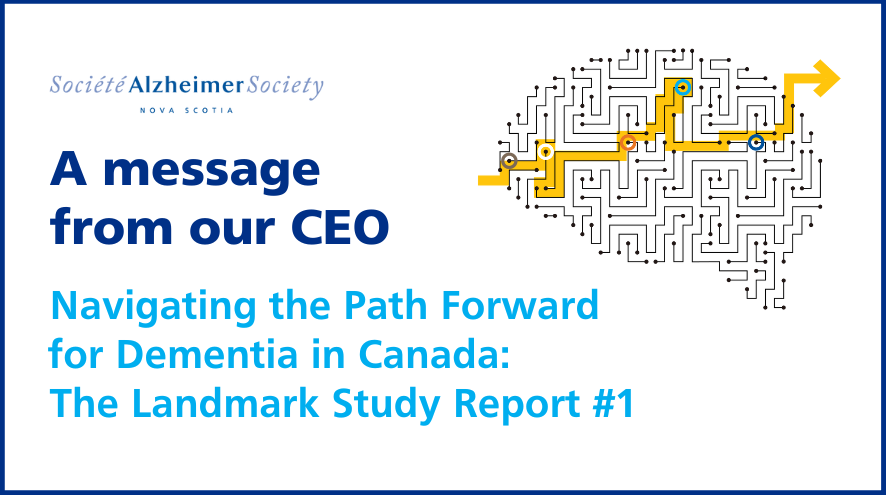A message from our CEO: Navigating the Path Forward for Dementia in Canada
With the release of Navigating the Path Forward for Dementia in Canada: The Landmark Study Report #1, and with projections set to rise so significantly, we all have a role to play – in reducing our own risk, and in ensuring those with dementia and those who support them can live well and remain engaged in their communities.

Today sees the release of The Landmark Study: Navigating the Path Forward for Dementia in Canada. With two further reports to follow in the next six months, this research is the first major study on dementia rates in Canada since 2010. It provides invaluable insight into what we can expect in terms of projections over the next 30 years, demographic breakdowns, and impacts on care partners.
Nova Scotia can expect to see the number of people with dementia increase by 87% by 2050. Our province has one of the oldest populations in the country, and in many ways, we are ‘ahead of the curve’ – already supporting elevated dementia numbers as the rest of the country starts to see their numbers rise. The data contained in this report has many implications for our population, our healthcare systems, and the Alzheimer Society of Nova Scotia.
Expanding Our Thinking
This new data comes at a time when we are already considering the devastating impacts of the pandemic – a clear indication of the fragility of some of our most vital services and systems, especially those that support our senior population. The major implication is that we need to expand our thinking about how we meet the growing needs of those affected by dementia and the need to engage in proactive risk reduction in our general population. The report shows extremely hopeful projections for reducing these numbers considerably by delaying the onset of dementia through risk reduction. Our 12 programs, and several major initiatives, take a multi-faceted approach, providing a wide range of supports for people with dementia, their care partners, and the healthcare system that serves them. Our confidential, province-wide InfoLine service provides tailored system navigation, referrals to our programming, including peer support groups, and extensive education. These services are vital, and we commit to expanding and refining them to meet these growing needs.
Expanding Our Focus
But something else needs to shift. If we are to be positioned to meet these increases head-on, we need to expand our focus and create a wider understanding of dementia in our communities. We need to take a leading role in raising the voices of those with lived experience and work with our provincial government to identify and resolve the issues of most importance to our clients. We need to ensure brain health is top of mind for Nova Scotians through dynamic public discourse and education. We need to continue our investment in vital research to advance therapies, treatments, and a cure. And we need to ensure that we are creating safe and welcoming communities and public services for those on the dementia journey.
In 2021, as we considered the post-pandemic needs of our clients, the Alzheimer Society of Nova Scotia completed an intensive, community-focused strategic planning exercise. The Landmark Study brings a whole new layer to our planning process and will help ensure our focus is where it can have the most impact.
This is an issue for ALL Nova Scotians. With projections set to rise so significantly, we all have a role to play – in reducing our own risk, and in ensuring those with dementia and those who support them can live well and remain engaged in their communities.
Learn more about Navigating the Path Forward for Dementia in Canada: The Landmark Study Report #1 here.
